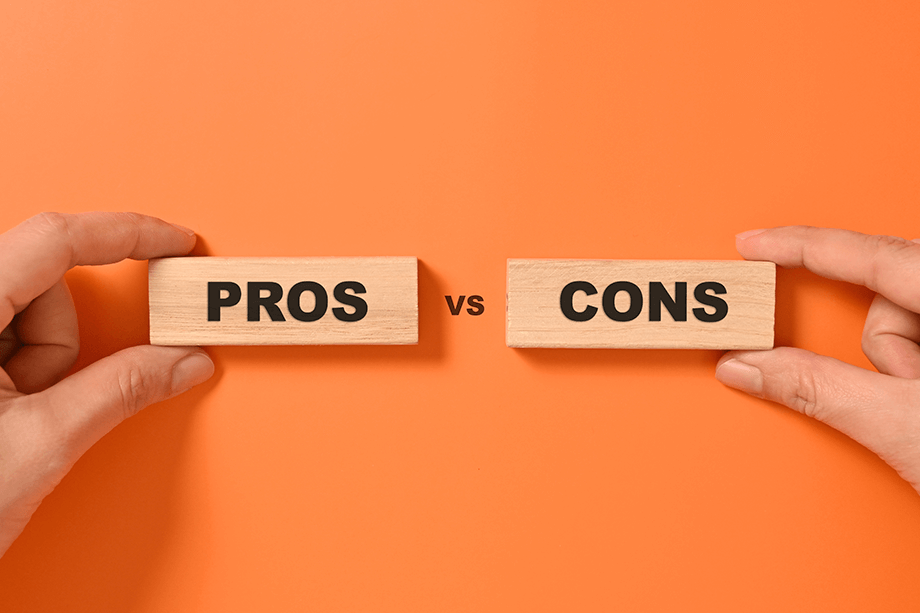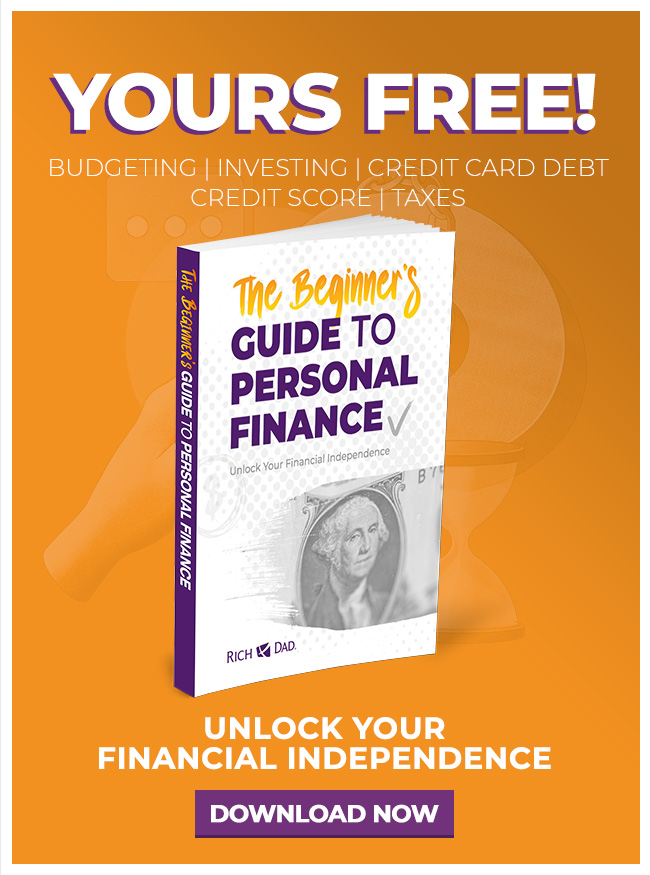Are you wondering if getting into real estate is right for you?
Both Robert and Kim Kiyosaki know (and love) real estate investing. They began investing in small, single-family homes in the late 1980s. Once ready to graduate to larger properties, they purchased a six-unit apartment building. Today, the Kiyosakis own more than 1,000 apartment units. As you can see, they started small and simply grew with time. Nearly every successful real estate investor started small, too. You’ll learn why shortly.
To be clear, when speaking of real estate, we’re focusing on rental real estate that produces a positive cash flow—things like single-family houses, a duplex, a triplex, an apartment building, an office building, retail stores, shopping centers, storage facilities, warehouse, mobile homes (more on that in a minute!), etc. It’s important to realize there are many options beyond a traditional house to invest in.
Pros of real estate investing
Let’s dive into the many reasons to invest in real estate:
- Leverage of OPM (Other People’s Money)
Think you need to dip into your own savings or start a GoFundMe to purchase a property? Think again! Here’s the concept of OPM in a nutshell: If you pay 10%-30% as a down payment, a bank, lending institution or private party will provide the rest of your funding. That means you can own a $100,000 piece of property for just $10,000 to $30,000. Where else in life can you get a deal like that? You may have come across a lot of Rich Dad content about financial intelligence, and understanding OPM is one sign of it. - Cash flow
If purchased and managed properly, your property can offer tremendous opportunities for a monthly profit. This is called cash flow, and this ongoing stream of income received from an investment is the reason the Kiyosaki’s love real estate. When you buy and rent out a piece of real estate, you’ll collect the rent each month and then pay expenses (such as the mortgage and any repairs). If you buy it at a good price, maintain a tenant and collect more than you spend each month, that positive cash flow is your profit. Beautiful, isn’t it? - Appreciation
There are two types of revenue you can earn from rental properties. We’ve already discussed cash flow, and the second is appreciation. If the value of your property has gone up and you decide to sell, your profit is called appreciation. Remember, even though you aren’t buying in hopes of selling to earn a quick profit (like the flippers on TV shows who fix a house up and immediately put it back on the market hoping for a massive payday), you should always have an exit strategy in place. - Fewer highs and lows
Don’t enjoy a stressful roller-coaster ride every time you see a stock market ticker flashing by? A cash-flowing property is not subject to the daily ups and downs of the markets because it is typically a longer-term play. And, as you may know, a down real estate market can actually be the best time to buy — so you may find yourself in the unique position of being excited when everyone else around you is nervous and losing money. It’s a wonderful position to be in, trust us. - Tax advantages
Tax credits are available for low-income housing, the rehabilitation of historical buildings, and certain other real estate investments. A tax credit is deducted directly from the tax you owe. You also get an annual deduction for depreciation, which is typically a percentage of the value of the property that you can write off as an expense against revenues. Finally, in some countries, the gains from the sale of real estate can be postponed indefinitely as long as the proceeds are reinvested in other real estate. What a bonus! - Less hectic
There’s no reason to make a rush decision when it comes to real estate investing. You usually have time to do your due diligence, analyze numbers, make comparisons and then make the best investment decision possible. So take your time and wait for the right opportunity.
Cons of real estate investing
It wouldn’t be right if we ignored the few disadvantages when it comes to real estate investments. After all, it’s important that you have a complete picture before you dive in:
- Time lag
Offers, counters, appraisals, inspections, financing—they all take time. This is why patience is a virtue. After you’ve been through it once, you’ll know what to expect on future opportunities. On your first time out, just focus on each phase individually and use the lag time to do more research to be sure you haven’t overlooked anything important. - Not liquid
You simply cannot jump in and out of real estate very quickly, making it difficult to convert the asset into cash in a hurry. Remember number six above, where I said time is on your side? Well, that’s not the case if you need to sell quickly. - Difficult and/or time-consuming
Of the five asset classes, real estate is the second most difficult (after business). Properties must be managed on a daily basis, including vacancies and bad tenants. This is also why we suggest starting small, because it’ll take up less of your time and it’s also a lot less expensive to make mistakes on a smaller scale.
So, now that you know the pros and cons, what’s next? Getting started and taking the first, small steps! Which one of these resonates with you?
Three common ways to start investing in real estate
- Residential rental property
Once you own a property, you become the landlord of your future tenants and are responsible for paying the mortgage, taxes and maintenance costs (and possibly a property manager, if you don’t want calls about broken appliances at midnight). Ideally, you’ll want to be able to charge more than your monthly costs, so that you earn a profit. This is your cash flow—your paycheck for filling the property with a quality tenant. For instance, Kim now owns thousands of apartment units across multiple states—but she didn’t start there. In fact, she started with one single-family house. - Real Estate Investment Trust (REIT)
A real estate investment trust (REIT) is created when a corporation (or trust) uses investors’ money to purchase and operate income properties (residential and commercial). REITs are bought and sold on the major exchanges, just like any other stock. According to Investopedia, a corporation must pay out 90% of its taxable profits in the form of dividends to keep its status as an REIT. By doing this, REITs avoid paying corporate income tax, whereas a regular company would be taxed its profits and then have to decide whether or not to distribute its after-tax profits as dividends. Since the 1960s, REITs have been a popular choice for income investors due to their reliable payouts and massive capital appreciation potential. - Real estate investment groups
If you want to own a rental property, but don’t want the effort associated with being a landlord, this option may be the right solution for you. Akin to small mutual funds for rental properties, a company will buy or build a set of apartment blocks or condos and then allow investors to buy them through the company, thus joining the group. The company operating the investment group manages all the units, handles maintenance, advertising vacancies and interviews possible tenants in exchange for a percentage of the monthly rent.
Start small for real estate investing success
Now that you’re aware of the pros and cons of investing in real estate, and some ways you can get started, it’s time to explain why every successful real estate investor started very small. If you have or are invested in real estate, it’s likely you started small as well.
There is a lot to learn, which means mistakes will be made. It’s all part of the process. When starting out, it’s a lot easier to make mistakes on smaller properties with smaller amounts of money.
Just how small can you start and still make a profit? Let’s illustrate with an example near and dear — Robert’s sister, Tenzin. She was a Buddhist nun with His Holiness the Dalai Lama. She never took a vow of poverty, as that is not required, but she did live quite the frugal lifestyle.
Since a costly medical scare, she realized that money does have a large role in her life, and she began her journey into money and investments.
Her search led her to an inexpensive, relatively easy way to get into real estate—mobile homes. Mobile homes are not common in many cities throughout the world. They are prefabricated or manufactured houses that technically can be transported.
What Tenzin found was that she could buy a used mobile home for about $3,000 and receive a positive cash flow of about $200 per month. That is a very healthy return on her money.
Tenzin also discovered that in California, where she lives, a mobile home is deemed a motor vehicle. She doesn’t go through the whole real estate process of getting title for this home.
She simply goes down to the Department of Motor Vehicles and picks up the title. Being a nun with many non-income-producing responsibilities, this is a viable solution for Tenzin as she began growing her asset column.
And there you have it — all the pros and cons of investing in real estate, clear as day. If you can work through those few disadvantages mentioned above (which certainly aren’t insurmountable — they simply take experience and education), you will become financially free with a fortune in real estate. Doesn’t that sound like the legacy you want to leave behind?







